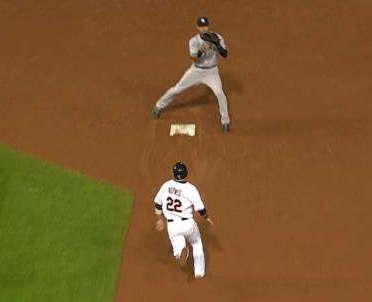It is extremely rare that a Major League umpire will call a runner safe at second base on a double play when the middle

You’ll get away with being “in the neighborhood” but only on a good feed.
infielder is “in the neighborhood.” What “in the neighborhood” means is that the fielder who turns the double play may not actually touch the bag at second but he is close enough (thus the phrase “in the neighborhood“) so the umpire calls the out. This is because when a good feed is made to the guy at the bag, the umpire watches the entire play at once and doesn’t really focus on any one thing.
This all changes when there is a poor feed made to the guy at the bag. As soon as the umpire recognizes that the throw is a poor one, the umpires eyes immediately focus on the fielder’s foot to see if remains in contact with the bag. If it is off even a little, the umpire will call safe. A player or coach may argue and say that the fielder was “in the neighborhood” just like other double play turns and therefore the runner should be out. Unfortunately, that’s not an argument he is likely to win.
The lesson in all of this for middle fielders is that when the double play feed is a good one to the bag, “in the neighborhood” (as long as it is not too obvious that the bag is missed) will work. On bad feeds to second, however, middle infielders must be sure to touch the bag. It may not be consistent on the part of the umpire but it’s just how the dynamics of the play works.

